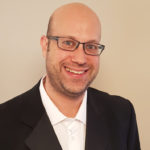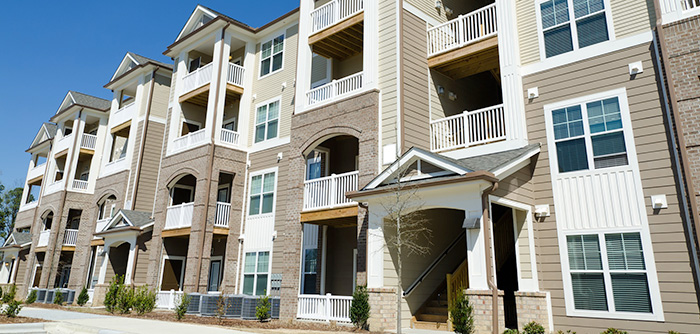
Sol Rosenbaum, Director
Green & Energy Services
(443) 320-0429
[email protected]
One of the newest additions to the GRS Group team is Solomon Rosenbaum, who has come on as the director of green and energy services. His focus is on sustainable green and energy projects, helping guide commercial real estate borrowers through the process of Fannie Mae and Freddie Mac’s green lending programs. For 15 years, he has worked in commercial real estate energy efficiency and due diligence. Rosenbaum has worked in every property sector and has had a specialized focus on ESPC (Energy Savings Performance Contracts) and PCA (Property Condition Assessment) reports. He is also a mentor to those entering the due diligence sector of commercial real estate and engineering in general. Rosenbaum recently spoke with us about his past CRE experience and what he is seeing in the industry.
How did you get involved in the commercial real estate industry?
Through the first half of my career, I worked as an energy engineer in several capacities and had never heard of a PCA report or really knew anything about the CRE world. About seven years ago, I had my own consulting work and had a handful of clients with whom I would perform energy audits. At the time, my primary client was growing and needed someone full time. I was offered a position but did not want to commit myself to one firm at that time. So I started looking through my LinkedIn connections for potential clients that could use my engineering services. One of my connections was the president of a large due-diligence firm and I reached out to him about some consulting work as a field inspector. He loved my experience but told me that flying me around for this work was not economical. However, he asked me if I was interested in working remotely to review energy audit calculations and reports for them. What started as just a few reviews per month led to PCA reviews for them and then for several other firms. I have since reviewed over 5,500 reports and have become very entrenched in the CRE world.
You specialize in green and energy lending projects. Are there particular property sectors impacted by these issues in particular or are others more challenging to work on than others?
My initial focus will be on the multifamily market and the Freddie Mac and Fannie Mae programs that are geared towards these types of properties. These programs overcame one of the toughest hurdles which is aligning the desires of the property owner and the tenants. In short, they created an incentive for the owner to invest money into energy efficiency projects even though much of the energy savings are recognized by the tenants. Going forward, I have plans to expand our services to other industries through additional green financing programs as well as offering general energy engineering services to our clients.
How can we frame the energy savings debate on the legislative level to bring about a consensus for action?
This is really a dilemma given the partisan nature of politics. Mentioning a topic like climate change can spur some to take action and others to dig in their heels against your proposal. I think that focusing on the economic side of things is the path we need to pursue. Take an issue like investment in renewable energy. Do we really care if someone supports these programs because of environmental reasons or because they want the United States to be free of market volatility in the fossil fuel industry? For both sides, making renewable energy economically beneficial will lead them to their end goal. Take the Fannie/Freddie program I mentioned above. Owners are incentivized to invest money in these energy savings projects and it doesn’t really matter where they stand politically. To me, this is the best path to get a large swath of people on the same page when it comes to energy savings.
You mentor people entering the engineering and CRE fields. If you could give them some advice, what would it be and why?
Over the years, I have had the opportunity to mentor many younger engineers and it is something that I really enjoy. Looking back at my career, I would not be where I am were it not for some of the guidance and mentorship I received over the years from various supervisors and colleagues. When it comes to engineering skills, I think the most valuable advice I can offer is to make an effort to understand the variables that are in play in your given situation and not just enter values. Once you have a real understanding of the variables, the formulas come alive and have meaning. This also gives you a better understanding of how the variables interact with one another. A close second in terms of advice is to never stop learning. This can be in the form of hands-on learning from a building engineer, formal classes/courses, or even a book.
Outside of hard engineering skills, I advise engineers to work on some of the peripheral skills that will help their career. These are skills such as writing, public speaking, or active networking which have really helped me in my career. There is no doubt that hard engineering skills are important, but those skills alone will not allow you to reach the next level.
What are some of your favorite energy engineering project memories?
One of my favorite projects was a large ESPC project at a naval base in New Orleans. Regarding the actual energy savings measures, this project was similar to some of the other energy projects on which I was involved. However, what made this project a new challenge was that I worked as the on-site construction/project manager and worked on the final commissioning. Additionally, as the onsite presence for the company, I had to calculate/design some engineering design changes on the fly based on previously unknown conditions. Being involved in all aspects of the project allowed me to develop a “big picture” view that has helped me in many projects since that time. Another project that always stands out for me was at a marine life research facility on the eastern shore of Maryland. We had to spend a significant amount of time understanding the research performed at the building in order to develop the energy savings measures to ensure the research was not compromised in any way. Seeing the oyster hatcheries and massive tanks of clownfish (like Nemo) was something very unique to that facility.
About GRS Group
GRS Group is a leading provider of commercial real estate (“CRE”) services worldwide. With offices across the United States, Europe, and affiliates around the globe, GRS Group provides local market knowledge with a global perspective for institutional real estate investors, occupiers and lenders worldwide. The GRS Group team has evaluated and advised on over $1 trillion in CRE transactions.
Through the company’s proprietary management process, Global Services Connection, GRS Group delivers an integrated suite of services including Financial Advisory, Transaction Management, Assessment and Title Insurance. We provide a single point of contact, capable of leveraging the GRS Group portfolio of companies and delivering customized solutions to assist our clients in achieving their investment goals.

